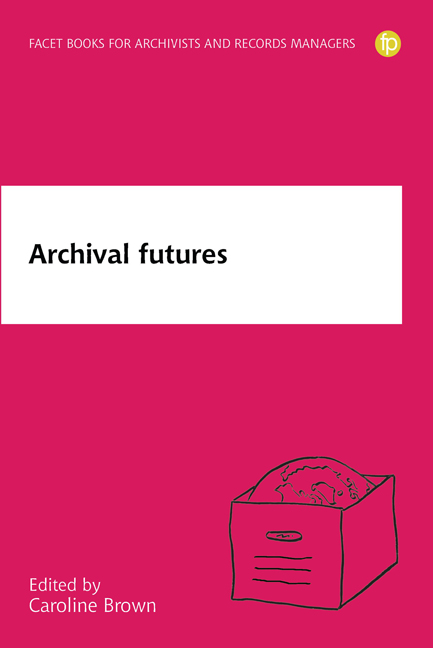Book contents
- Frontmatter
- Dedication
- Contents
- Notes on contributors
- Introduction
- 1 It's the end of the archival profession as we know it, and I feel fine
- 2 Whose truth? Records and archives as evidence in the era of post-truth and disinformation
- 3 The future of archives as networked, decentralised, autonomous and global
- 4 Can we keep everything? The future of appraisal in a world of digital profusion
- 5 Frames and the future of archival processing
- 6 Access technologies for the disruptive digital archive
- 7 Multiple rights in records: the role of recordkeeping informatics
- 8 The accidental archive
- 9 The end of archival ideas?
- Index
8 - The accidental archive
Published online by Cambridge University Press: 01 June 2019
- Frontmatter
- Dedication
- Contents
- Notes on contributors
- Introduction
- 1 It's the end of the archival profession as we know it, and I feel fine
- 2 Whose truth? Records and archives as evidence in the era of post-truth and disinformation
- 3 The future of archives as networked, decentralised, autonomous and global
- 4 Can we keep everything? The future of appraisal in a world of digital profusion
- 5 Frames and the future of archival processing
- 6 Access technologies for the disruptive digital archive
- 7 Multiple rights in records: the role of recordkeeping informatics
- 8 The accidental archive
- 9 The end of archival ideas?
- Index
Summary
Introduction
In the Chinese philosopher Zhuangzi's famous parable, Zhuang Zhou dreams he is a butterfly, only to awake to discover that he was a man, but he is left with the nagging doubt as to whether he was Zhuang Zhou who had dreamed he was a butterfly or if he was a butterfly dreaming he was a man (Giles, 1926, 47). Brewster Kahle dreamed he could archive the internet, but in this chapter we will argue that he will wake up one day to find that the internet has archived him. Far from being an object that is archived, we will argue that the internet is itself an archive, but one which does not conform to the rules of archiving as we know them. The chapter will further go on to dem - onstrate that, like the world in which men can wake up to find they are butterflies, the internet as archive has a unique ability to change the past as well as the present. Those of us who work in the field of memory institutions need to confront this new world in which the internet is not archived but is the archive, not by claiming that it is not but by exploring its properties and possibilities.
In 2011, the Cinque Port Scribes mounted The Last Word exhibition that toured five of the churches on Romney Marsh: ‘using redundant books and calligraphy developed as part of a discussion of digital books and their impact on the printed book market and whether this may lead to printed books becoming as precious as the hand-written manuscripts they originally represented’. Perhaps surprisingly it was not a lament but a paean of wonder at the potential of this new form of communication.
One piece made from beautifully scripted strips of paper was ‘Els’ Chrysalis’ by Els Van Den Steen with the legend: ‘Metamorphosis – to be reborn anew to live again’ Beside it the artist had written poignantly: ‘The metamorphosis of the printed book is taking place right now! And just like before, the written word is evolving into a new form … To achieve the decomposing effect of the printed book, I used a rifle and a shotgun … Will the new ebook be a beautiful butterfly?’
- Type
- Chapter
- Information
- Archival Futures , pp. 117 - 136Publisher: FacetPrint publication year: 2018
- 1
- Cited by

